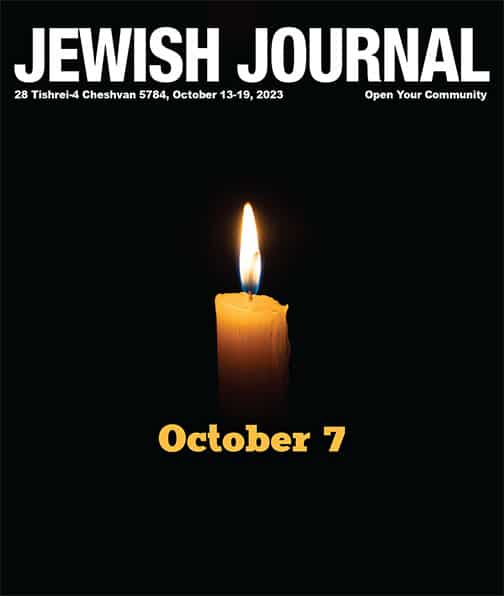
When readers opened the Jewish Journal this week, what they saw was page after page of coverage of the massacres of October 7, arguably the biggest Jewish story of our time. With more than 1300 lives brutally extinguished and many thousands wounded, this was a calamity of unspeakable proportions. The images of the barbaric violence were virtually impossible to watch.
This is one of the realities of journalism in times of intense human pain—it doesn’t allow journalists much time to feel that pain.
As I saw the horror, which got worse by the hour, my mind swung wildly between the disaster and my job. Consumed by grief one minute, obsessed with our coverage the next.
These rival impulses haven’t gotten resolved. They’re still with me; they’re still competing for my attention. One minute I feel like crying over an image of a baby I can’t even describe, the next minute I must respond to a writer waiting to hear about her op-ed submission.
One minute my heart crumbles as I read about an Israeli family burned to death in a safe room, the next minute I have to decide what war story should replace our music page.
One minute I read about the 260 young souls massacred at a desert party (which my daughter often attended when she studied in Israel), the next minute I have to decide if we should replace our popular Rabbis of LA page with a special prayer.
This whiplash went on for the good part of 48 hours, right up until the minute we went to press. I would text a friend who lives on the Gaza border to see if she was OK, and wait anxiously for her response, while getting back to the printer about how many pages we will need.
Meanwhile, the story got so big that we had to revamp our website home page to accommodate all the stories that were coming in. And as I wrote my own commentaries, I continued to grieve as the casualty count kept rising and the pictures got more horrific.
This is not a complaint. I understand that my professional obligation is to put emotions aside and work with the team to deliver the best possible coverage. I get that.
But I’m sharing all this because how we cover this enormous story and what we go through can itself capture the enormity of the moment.
For example, as the hours wore on, I noticed a kind of hidden force at work. I knew we had to pull stories we had already scheduled for this edition, including our cover story (which, ironically, was about Israel’s contributions to the field of solar energy, with the headline, “Here Comes the Sun”), but I didn’t know exactly how many or which stories we would have to pull.
I noticed that as we got closer to press time, rushing to gather as many war stories from as many angles as possible, we were replacing more and more non-war stories. A slew of our regular contributors were submitting their own pieces, some at the last minute. Anything that didn’t deal with the war– food, movies, arts, book, op-eds and local stories– became fair game.
By the end, we had gathered so much war coverage (more than 30 stories) that we had only one non-war page left—our Table for Five. We decided if we should keep only one page, let’s keep the Torah page.
As our readers go through this special October 7 issue, they won’t see any of the anxiety and last-minute decisions that went on behind the scenes. Everything looks neat and professional in the final product. I guess that’s the way it should be.
But I have to say that part of me is still an emotional mess. The images of the victims haunt me. The thought of grieving families haunts me even more. I can’t stop thinking of the hostages. I worry that things may get worse.
The work impulse, however, never stops pulling: After the October 7 edition went to press, we had the jump on the next edition and gather more war stories, because this crisis and this whiplash are not going away anytime soon.
Oh, and if you were wondering about my friend on the Gaza border, she finally got back to me. She and her son are OK.
Shabbat shalom.























 More news and opinions than at a Shabbat dinner, right in your inbox.
More news and opinions than at a Shabbat dinner, right in your inbox.